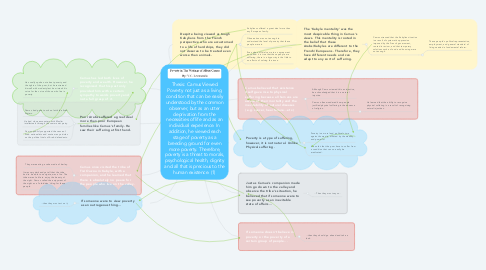Thesis: Camus Viewed Poverty not just as a living condition that can be easily understood by the common observer, but as an utter deprivation from the necessities of life and as an individual experience. In addition, he viewed each stage of poverty as a breeding ground for even more poverty. Therefore, poverty is a threat to morals, psychological health, dignity and all that is precious to the human existence. (1)
by Ghada Alsulaiti


1. Despite being viewed as tough Kabylians from the French perspective who are accustomed to a life of hardships, they did not deserve to be treated even worse than animals.
1.1. Kabylians suffered a great deal more than any European family.
1.2. Observation was not enough to understand the level of poverty that these people were in.
1.3. Even when official came to an agreement as to how it is true that these people are suffering, there is a hypocrisy in the little to no efforts of solving the issue.
2. Camus has led both lives of poverty and wealth. However, he recognized that his past only provided him with a certain sympathy towards poverty and not a full grasp of it.
2.1. He usually spoke out about poverty and the rights of the poor, but he restrained himself with modesty lest he mistook his voice for the voice of those who live in poverty.
3. Poor Arabs suffered a great deal more than poor European families like Camus's family. He saw their suffering at first hand.
3.1. Camus had gone to school with the Arab Algiers.
3.2. He had close encounters with Muslim intellectuals through the communist party.
3.3. Camus publicly supported the cause of Arab nationalists and wrote many articles on the political trials of Arab defendants.
4. Camus once visited the tribe of Tizi Ouzou in Kabyle, with a companion, and he learned that there is absolutely no peace for the people who live on the valley.
4.1. They were eating a cake made of barley.
4.2. It was very dark and yet all that the tribe had to be able to navigate, was a fire. The tribe weren't able to enjoy the beauty of the night. Camus called the enjoyment of the night as a 'forbidden' thing for these people.
5. If someone were to view poverty as an outrageous thing...
5.1. ...then they must act on it,
6. The 'Kabyle mentality' was the most despicable thing in Camus's views. This mentality is rooted in the belief that these Arabs/Kabyles are different to the French/Europeans. Therefore, they have different needs and can adapt to any sort of suffering.
6.1. Camus stressed that the Kabylian situation is a result of systematic oppression imposed by the French government, rooted in racism, and that temporary solutions such as food and housing were not enough.
6.1.1. These people's political representation, employment, and general standard of living needed a fundamental reform.
7. Camus believed that existence itself gave rise to physical suffering because all humans are aware of their mortality and the inevitability of natural diseases (e.g. cancer, hear failure...etc.)
7.1. Although Camus viewed this as injustice, he acknowledged that it is a natural injustice.
7.2. Camus often wondered how people justified physical suffering in the absence of religion.
7.2.1. He learned that the ability to recognize physical suffering is a result of recognizing natural injustices.
